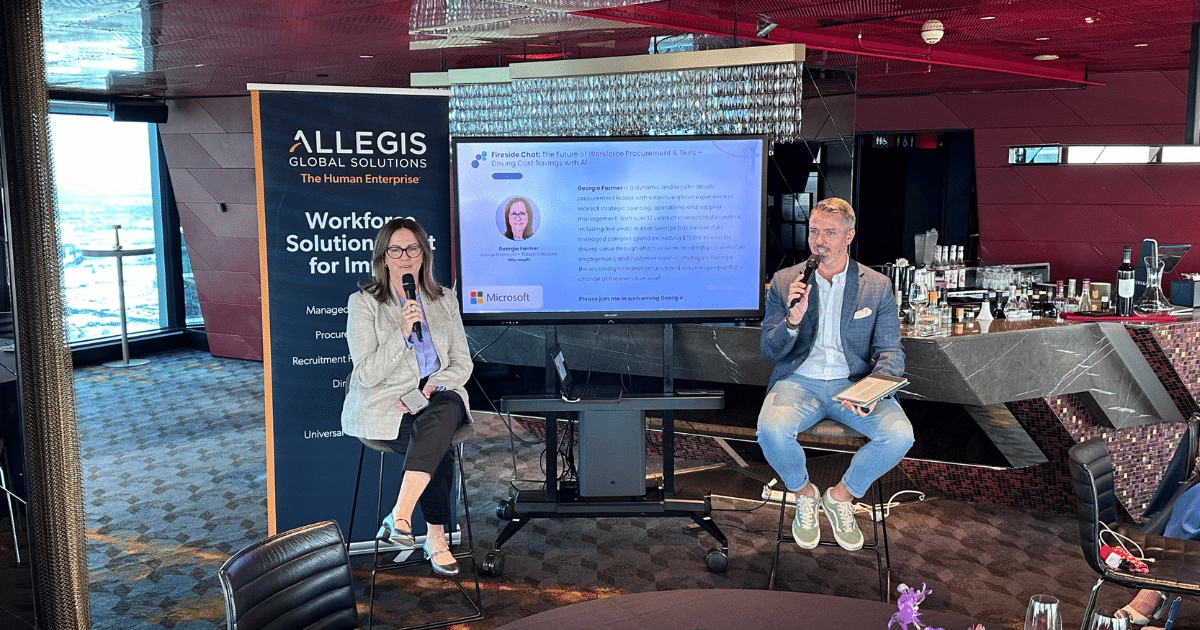The rapid evolution of artificial intelligence is transforming workforce management, procurement, and talent strategies at an unprecedented pace. At TALiNT Partners, we have been at the forefront of these discussions, bringing together industry leaders across APAC to explore how AI is driving efficiencies and cost savings in the extended workforce. Our recent four-part roadshow, ‘Achieve Real Cost Savings Across the Extended Workforce with Generative AI,’ provided a platform for HR, Procurement, and Talent experts to share insights on leveraging AI for smarter workforce decisions.
Navigating AI-Driven Workforce Transformation
The series of events, held across Singapore, Sydney, Melbourne, and Hong Kong, explored and uncovered key challenges and opportunities presented by AI across all people departments. We examined the role of AI in streamlining Statement of Work (SOW) and Request for Proposal (RFP) processes, optimising workforce planning, and improving hiring strategies through intelligent automation. With each session, it became increasingly clear that while AI offers tremendous potential, organisations must strike a balance between cost efficiency, compliance, and trust in AI-generated outcomes.
Part 1: AI in Workforce Procurement & HR – Singapore, 25th February
The first session in Singapore, co-hosted with Allegis Global Solutions and Civitas Talent at Artemis Restaurant, set the stage for discussions on AI’s expanding role in workforce procurement. Leaders explored how AI-driven automation is enhancing cost forecasting, enabling more agile decision-making, and helping organisations build truly borderless workforces. The conversation also touched on how businesses can strategically integrate AI while maintaining compliance with regional workforce regulations, and keeping the human touch throughout.
Key discussion points included:
- Enhancing Cost Efficiency in Workforce Procurement – Attendees examined best practices for optimising procurement costs without compromising workforce quality, leveraging AI-driven analytics, supplier consolidation, and total cost of ownership (TCO) strategies.
- The Future of Workforce Planning with AI – We explored AI-powered skill matching, workforce demand forecasting, diversity and inclusion enhancement, and compliance considerations for AI-driven decision-making.
Part 2: AI-Driven Skills Intelligence & Procurement – Sydney, 27th February
In Sydney, in collaboration with Allegis Global Solutions and Remote, we examined how AI is revolutionising talent acquisition and workforce planning, and enhancing the ability to hire cross-border with changes to legislation and extended workforce management in ANZ & APAC. One of the central discussions focused on the complexities of skills taxonomy and ontology, how organisations are managing skills classification and whether this process is still largely manual or increasingly automated.
Other key themes included:
- Employer Branding & EVP Investment – Are organisations proactively investing in Employee Value Proposition (EVP) and Employer Value Proposition (EVP), and Candidate Value Experience (CVP) or are they simply reacting to market shifts?
- Hybrid Workforce Management – How are businesses balancing full-time, contingent, and gig workforce strategies in an AI-driven market?
Part 3: AI, Change Readiness, and Workforce Strategy – Melbourne, 28th February
The Melbourne session, co-hosted with Allegis Global Solutions and Eightfold, brought a sharp focus on AI’s impact on cost savings and procurement efficiency, while building skills based approach across your organisation. One of the most pressing discussions revolved around the monetary thresholds for procurement involvement in RFP processes. Many organisations questioned whether procurement teams should only be engaged for purchases above a certain value, for example $500,000 or $2 million etc, or whether AI-driven efficiencies could justify greater involvement in lower-value transactions, allowing automation and AI to take care of many more of these processes, allowing “the humans” to be more strategic and become relationship managers across the internal business.
Another key topic was Change Readiness. As AI adoption accelerates, are organisations truly prepared for transformation? The discussion touched on Adaptability Quotient (AQ) and change management, with a consensus that businesses should prioritise these skills when hiring. Yet, many admitted that change management is often overlooked in recruitment, raising concerns about the workforce’s ability to keep pace with technological advancements.
Part 4: Trusting AI in Workforce Procurement – Hong Kong, 4th March
The final session in Hong Kong, held exclusively with Allegis Global Solutions, explored a critical question: How much trust do businesses place in AI-generated results? While AI can automate numerous processes, attendees debated whether organisations (and individuals) are spending as much time vetting AI outputs as they would completing tasks manually. If quality assurance remains as time-consuming as manual work, then are businesses truly realising the promised efficiencies of AI?
Another eye-opening statistic emerged during this session—over 80% of procurement spend never even reaches procurement teams. This raises concerns about inefficiencies, as procurement departments tend to focus only on high-end purchases such as strategic partnerships, technology, and services, while smaller-value transactions are managed elsewhere in the business. The discussion underscored the potential for AI to bridge this gap, enabling procurement teams to manage costs more effectively across all levels of spending.
The Future of AI in Workforce Strategy
Across all four sessions, a recurring theme was the evolving economic impact of AI. While many assume AI primarily replaces lower-skilled jobs, the discussion revealed that businesses are increasingly using AI to reduce high-end costs, such as higher legal and accounting expenses, rather than solely focusing on automating lower-wage roles. Platforms like Globality, which can condense traditional SOW and RFP processes from 6-12 months down to sub 25 minutes, exemplify the scale of AI-driven efficiencies now available.
As we reflect on these discussions, the key question remains: How can organisations ensure AI adoption translates into true cost savings rather than merely adding another layer of oversight? At TALiNT Partners, we remain committed to facilitating these critical conversations, helping businesses navigate the evolving availability of AI-driven workforce management, in the form of partnerships, tools, technology and partners. The insights from this roadshow reaffirm that AI has the power to reshape procurement, talent acquisition, and workforce planning, but only if organisations’ embrace it with a strategic and trust-based approach.










